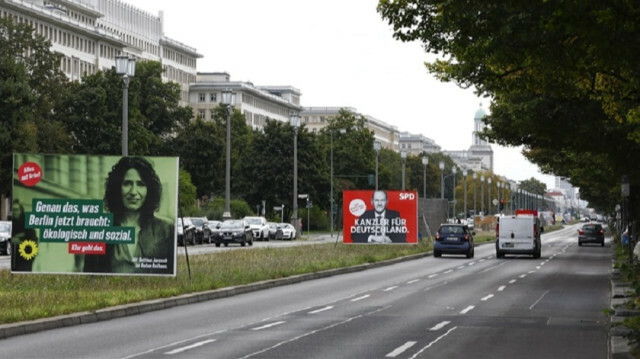
Conservative leader Armin Laschet, Social Democrats’ Olaf Scholz neck and neck to replace Angela Merkel as chancellor
German voters will head to polls on Sunday to elect a new parliament, and the result will determine who will succeed Angela Merkel as the chancellor.
Olaf Scholz, the candidate of the Social Democratic Party (SPD), tops popularity ratings, while conservative leader Armin Laschet is still hopeful that the Christian Democrats (CDU/CSU) will win the election and he will become the new chancellor.
The Greens’ candidate Annalena Baerbock is placed third in the surveys.
Only two days before the polls, nearly 35% of the voters were still undecided about who they would vote for or if they would vote at all, a new poll showed, making predictions difficult ahead of the historic vote.
- First-time voters
In Germany’s 2021 parliamentary election, nearly 60.4 million citizens are eligible to vote, among them 2.9 million are first-time voters, according to authorities.
Nearly 8.4 million German voters are under 30, and their political inclinations are expected to have a role in the establishment of a coalition government following the elections.
Polling data show that a higher youth voter turnout would mostly favor the environmentalist Greens and the liberal Free Democrats, rather than the traditional, established parties.
Chancellor Angela Merkel is still the country’s most popular politician, but she is not running for another term and did not take an active role in the political campaign of her Christian Democrats.
- Close race expected
According to public broadcaster ZDF, Laschet’s CDU/CSU alliance gained one point this week to reach 23%, while Scholz’s Social Democrats maintained their lead with 25% in the latest poll conducted by the institute Forschungsgruppe Wahlen.
Baerbock’s environmentalist Greens was polled at 16.5% with a rise of 0.5 points. The party has almost doubled its support compared to the last election in 2017.
Friday’s poll put support for the Free Democratic Party (FDP) at 11%, strengthening the hope of liberals that their party can play a kingmaker role in determining the new coalition government.
The far-right Alternative for Germany (AfD) was 10%, down by one point, while the anti-capitalist party Left was polled at 6% in the same survey.
- Possible coalition scenarios
The latest polls show that none of the parties will get enough votes to govern alone, and the winning party’s chancellor candidate will likely face tough negotiations to form a coalition government.
The Social Democrats’ candidate Scholz has already announced that they would prefer to form a government with the environmentalist Greens. But recent polls suggest that his party would need a third partner to secure a majority at Bundestag.
The liberal FDP has not ruled out a coalition with the SPD and the Greens, which is often referred as the “traffic light coalition” in media due to the parties’ traditional colors. But the three parties have deep differences over a wide range of issues, including minimum wage and tax increases on the wealthy.
The Social Democrats and the Greens have the other option of forming a coalition with the socialist party Left, the so-called “red-red-green coalition,” but the Left’s extreme position on the economy and foreign policy matters raises questions about the stability of such a government.
Neither Scholz, nor the Greens’ chancellor candidate Baerbock has so far ruled out this coalition option.
- CDU/CSU’s coalition options
If Laschet’s CDU/CSU alliance wins the elections, the Christian Democrats will also need two coalition partners to secure a Bundestag majority, all the latest polls show.
Laschet views the liberal Free Democrats as a potential coalition partner, as the two parties share many common positions. But their opposition to the ambitious climate goals of the Greens remains one of the thorniest issues for the leaders to resolve.
The potential governing coalition between the three has been dubbed “Jamaica coalition” because the symbolic colors of these parties match with the colors of the flag of Jamaica.
The continuation of the current “grand coalition” between the Social Democrats and the Christian Democrats is also a possibility, but senior figures of both parties repeatedly said it is not their preferred option.
The SPD’s youth organization and the party’s co-chair Saskia Esken publicly rejected a new coalition government with the CDU/CSU bloc, and the idea has been hugely unpopular among the party’s base.
Leading members of the CDU/CSU, on the other hand, are opposing an SPD-led “grand coalition” option, in which the Christian Democrats will be the junior partner.

